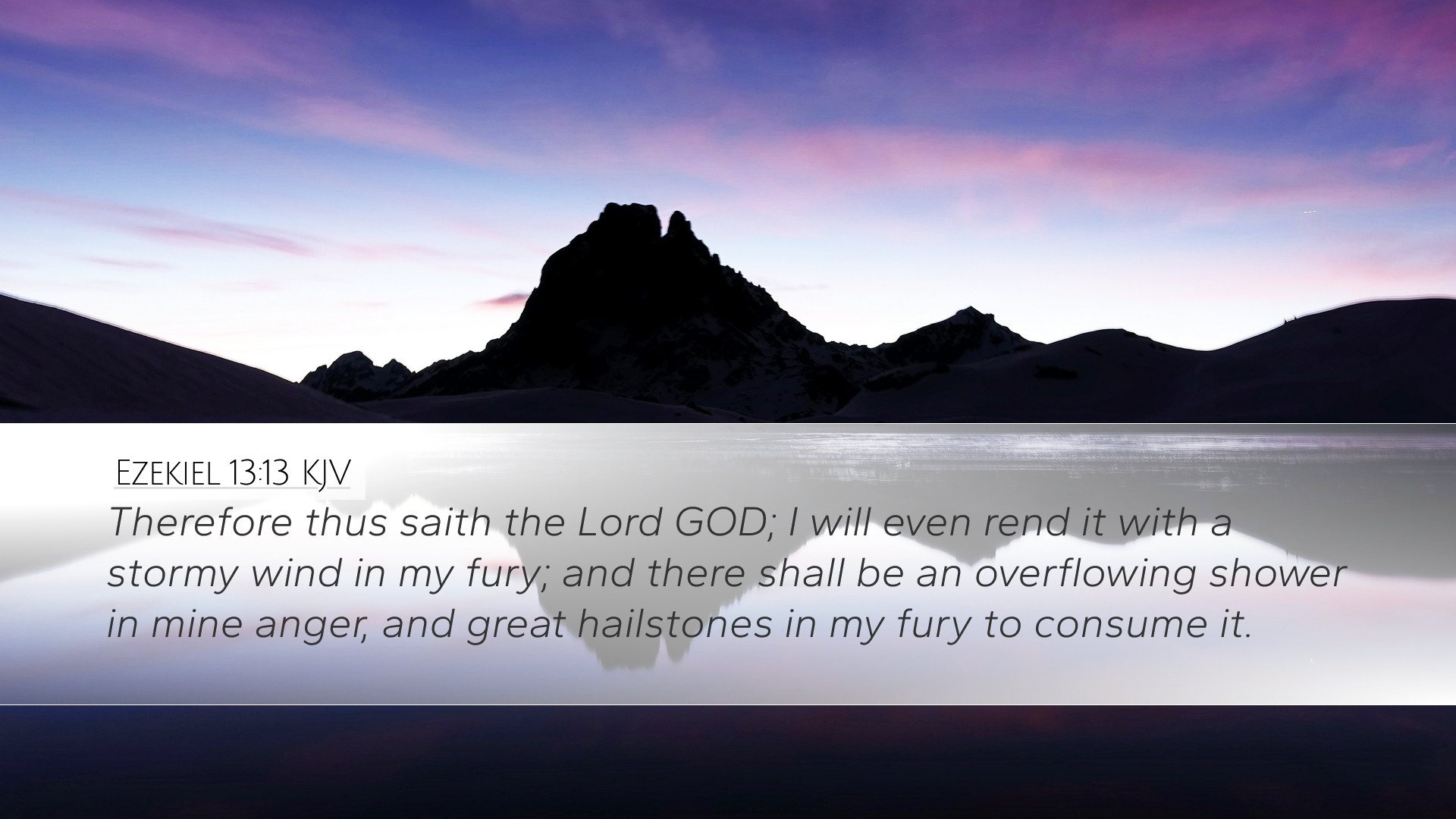Ezekiel 13:13 - Commentary Overview
In Ezekiel 13:13, the verse states:
“Therefore thus says the Lord God: ‘I will bring a sword upon you and destroy with you the walls of your high towers and bring down your towers into ruins.’”
This passage reflects God's judgment upon false prophets and leaders in Israel during a period of great moral decline. It underscores the consequences of leading the people away from God’s truth and the overall theme of divine retribution found throughout the prophetic literature.
Insights from Public Domain Commentaries
Matthew Henry's Commentary
Judgment on False Prophets: Matthew Henry emphasizes that this verse highlights God’s direct response to the false prophets who were misleading His people. He notes that these false prophets were like builders who erected walls without the Lord's approval, thus leading to inevitable destruction.
Destruction of False Security: Henry explains the imagery of "high towers" and "walls" as symbols of the false security that these prophets provided. These structures represented the confidence of the people in their misguided teachings, which, despite appearing strong, would ultimately fail against God’s judgment.
Divine Sovereignty: He points out that this verse reveals God's sovereignty in dealing with corruption in His people, and His use of the sword symbolizes both literal and spiritual warfare against those who pervert His word.
Albert Barnes' Commentary
Prophetic Responsibility: Albert Barnes articulates the gravity of the responsibility borne by prophets. He suggests that the verse serves as a stern warning against those who claim to speak on God’s behalf yet lead others astray. This underscores the severe consequences awaiting those who misrepresent God’s message.
Liberal Interpretation of Security: Barnes notes the structural metaphor of the “walls” and “towers” often signifies the false hope that people place in their own security measures rather than reliance on God. He illustrates how these misplaced confidences lead to disaster.
God's Active Judgment: According to Barnes, the “sword” could indicate divine judgment through various means, possibly through foreign armies or natural disasters, affirming God’s active role in historical events as a means of discipline.
Adam Clarke's Commentary
Symbolic Imagery: Adam Clarke elaborates on the symbolic meanings within the text, asserting that the high towers represent not only spiritual pride but also the false religious structures that the prophets had erected. Such edifices have no lasting power against divine judgment.
Consequences of Idolatry: Clarke discusses the historical context, indicating that idolatry led the people of Israel to trust in these false religious practices rather than adhering to God’s covenant, resulting in dire consequences reflected in God’s judgment.
Call to Genuine Prophecy: Clarke urges an understanding of the role of the true prophet, contrasting it with the false prophets who misinterpret or manipulate God’s will. True prophecy should align with God's righteousness and lead the people back to Him.
Theological Reflections
Ezekiel 13:13 serves as a pivotal reminder of the importance of fidelity to God's teachings. Each commentary reflects a shared understanding that:
- The gravity of misleading others: False teachings can have eternal ramifications, emphasizing the pastoral responsibility for sound doctrine.
- The importance of divine judgment: Understanding that God is sovereign and will intervene in history for both condemnation and correction.
- The role of prophets: Distinguishing between true and false prophets is crucial for the health of the Church and the well-being of its members.
- Warning against complacency: The false sense of security in misplaced trust can lead to spiritual and physical ruin, urging believers to remain vigilant and obedient.
Application for Today
As pastors, students, theologians, and scholars engage with this passage, several applications can be drawn:
- Critical Spirit: Encourage a discerning approach to teachings and leaders within the church, ensuring alignment with scripture.
- Discipleship: Foster a culture of accountability among believers, promoting open discussions about doctrine and practices.
- Faithfulness to God’s Word: Reinforce the importance of grounding faith and practice in the true teachings of scripture, guarding against cultural influences that may lead to compromise.
- Awareness of Judgment: Cultivate a respect for God’s holy judgment as both a warning and a call to genuine faith and repentance.
Conclusion
The message of Ezekiel 13:13 transcends the historical context, providing timeless insights for the Church today. Through the lenses of ancient scholars like Matthew Henry, Albert Barnes, and Adam Clarke, we derive a rich theological foundation that calls believers to vigilance, fidelity to God's Word, and a profound understanding of the consequences of leadership in the faith community.


